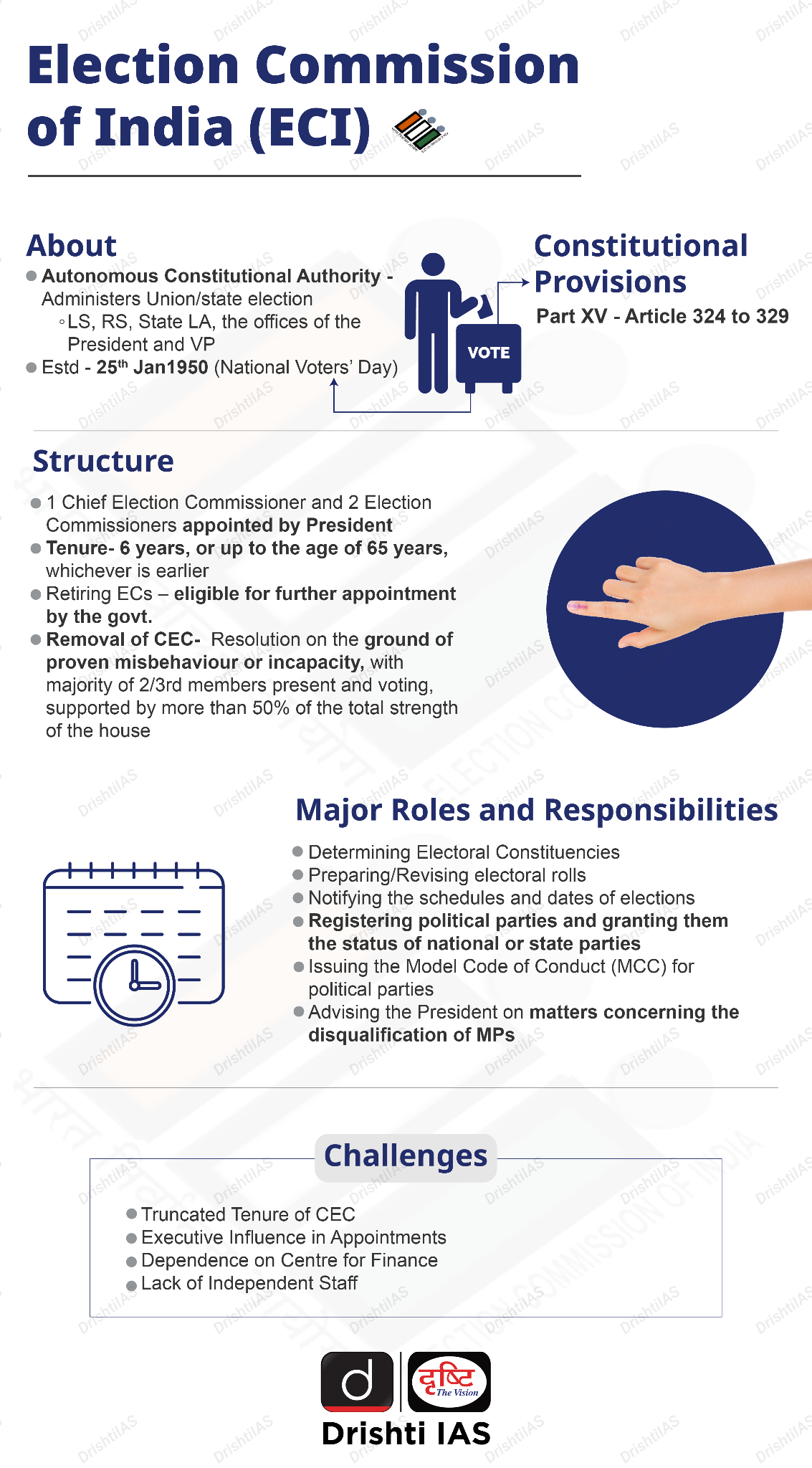Important Facts For Prelims
Alternative Voting Methods
- 27 May 2024
- 7 min read
Why in News?
Recently, voters have been polling in the world's largest election, the general election to elect members of the 18th Lok Sabha in India, taking place over seven phases.
What are the Alternative Methods of Voting Available to Citizens?
- Voting Process under the RPA:
- The Representation of the People Act, 1951 (RPA) mandates in-person voting at assigned polling stations using Electronic Voting Machines (EVMs), with exceptions for certain voters to ensure universal suffrage.
- Postal Ballot: ‘Postal ballot’ allows voters who cannot be physically present in polling stations to vote remotely, as specified in Section 60 of the RPA.
- This method differs from normal voting in three ways:
- Polling takes place outside the polling station
- It takes place without EVMs
- Polling takes place before the designated poll date in the constituency.
- Eligibility: As per Rule 18 of The Conduct of Election Rules, 1961, the following classes of persons are entitled to vote by postal ballot:
- Special Voters: Individuals holding declared office under Section 20(4) of RPA, including the President, Vice President, Governors, Cabinet Ministers, other high-ranking dignitaries, etc. and their spouses.
- Service Voters: Members of the Indian armed forces, paramilitary forces, an armed state police member serving outside their state, or a government employee stationed abroad and their spouses residing with them.
- Voters on Election Duty: All individuals from Commission officials to private personnel involved in polling duties are included.
- Absentee Voters under Section 60(c) of RPA 1951: In 2019, the Election Commission established the 'Absentee Voters' category encompassing senior citizens aged 85+, persons with disabilities with at least 40% disability, Covid-19 suspect or affected individuals, and essential services workers such as railways, telecom, electricity, health, traffic, aviation, fire services, and authorised media personnel.
- Under Preventive Detention: Electors subjected to preventive detention.
- Application Process: Eligible individuals for postal voting must formally apply within a specified timeframe, while service voters and those under Preventive Detention receive postal ballots automatically and cannot vote in person once issued.
- Electronically Transmitted Postal Ballot System (ETPBS): In 2016, an amendment to Rule 23 introduced the Electronically Transmitted Postal Ballot System (ETPBS) for Service Voters, facilitating faster delivery of postal ballots through encrypted electronic transmission and free return via post.
- Process:
- Rule 18A, introduced in 2022, mandates voters on election duty to vote at designated Facilitation Centers using postal ballots.
- Similarly, an appropriate venue and room for the Postal Voting Centre (PVC) are identified to facilitate voting by absent voters in the Essential Services (AVES) category.
- This method differs from normal voting in three ways:
- Home Voting:
- Criterion: Over 81 lakh 85+ aged voters and 90 lakh PwD voters are registered in the electoral roll nationwide.
- Process: For absentee voters in the category of senior citizens (AVSC) and PWDs over 85, and Covid-19 Suspect/positive, Booth Level Officers (BLOs) deliver Form 12D and compulsorily obtain acknowledgments from them.
- Miscellaneous:
- Voting in a Different Polling Centre: When an election worker is assigned to their registered constituency, they receive an Election Duty Certificate allowing them to vote at their assigned polling station; otherwise, they're eligible for a postal ballot.
- Proxy voting: Armed and paramilitary service members can vote via proxy or postal ballot; those opting for proxy are termed 'Classified Service Voters'.
- Assisted Voting: In case of voter disability, the Presiding Officer may permit a companion over 18 to vote on their behalf, with indelible ink applied to the companion's right index finger.
Disqualification from the Voting Process
- Individuals who are convicted of offences committed under Section 171E (which deals with bribery) and Section 171F (which deals with personation or undue influence at an election) of the Indian Penal Code are disqualified from participating in elections.
- Those convicted of offences under Section 125 (which deals with various electoral offences), Section 135, and Section 136 of the Representation of the People Act, 1951 face disqualification from elections.
- If an individual votes in more than one constituency, his vote is disqualified.
UPSC Civil Services Examination, Previous Year Questions (PYQs)
Prelims
Q. Consider the following statements: (2017)
- The Election Commission of India is a five-member body.
- The Union Ministry of Home Affairs decides the election schedule for the conduct of both general elections and bye-elections.
- Election Commission resolves the disputes relating to splits/mergers of recognised political parties.
Which of the statements given above is/are correct?
(a) 1 and 2 only
(b) 2 only
(c) 2 and 3 only
(d) 3 only
Ans: (d)
Q2. Consider the following statements: (2020)
- According to the Constitution of India, a person who is eligible to vote can be made a minister in a State for six months even if he/she is not a member of the Legislature of that State.
- According to the Representation of People Act, 1951, a person convicted of a criminal offense and sentenced to imprisonment for five years is permanently disqualified from contesting an election even after his release from prison.
Which of the statements given above is/are correct?
(a) 1 only
(b) 2 only
(c) Both 1 and 2
(d) Neither 1 nor 2
Ans: (d)





